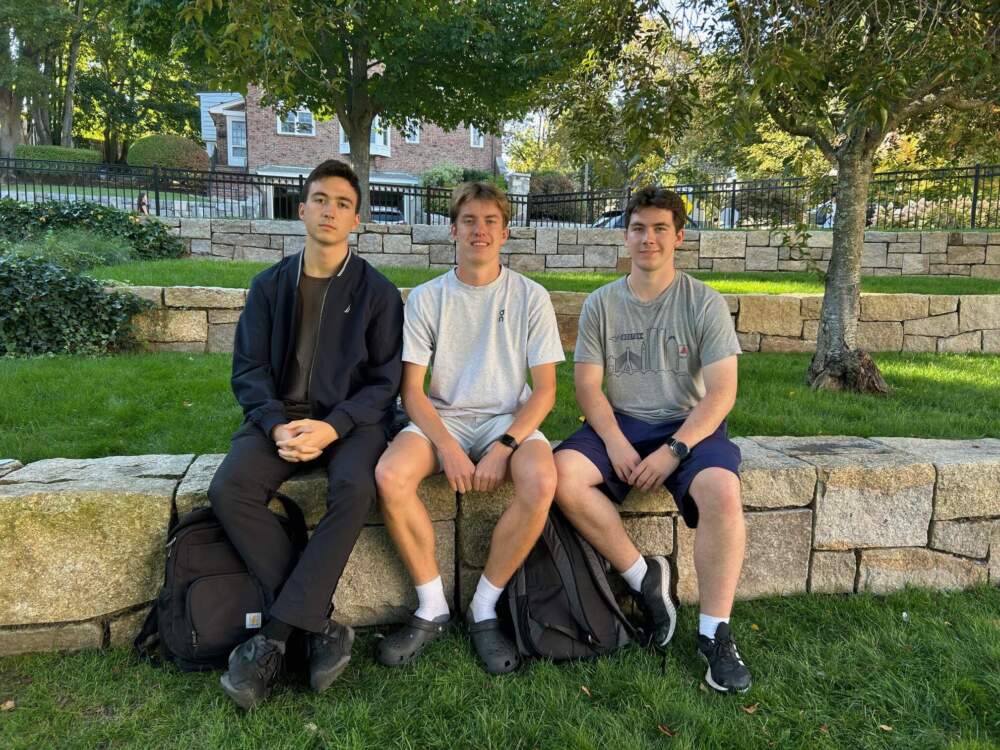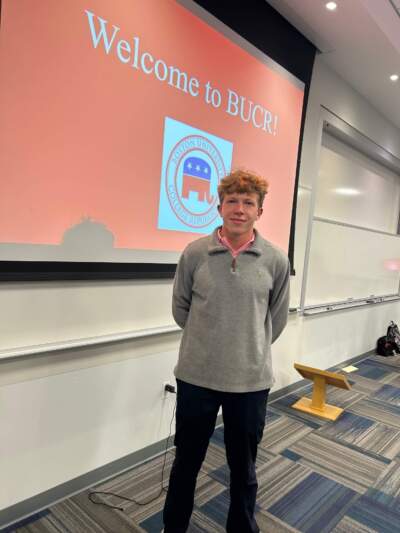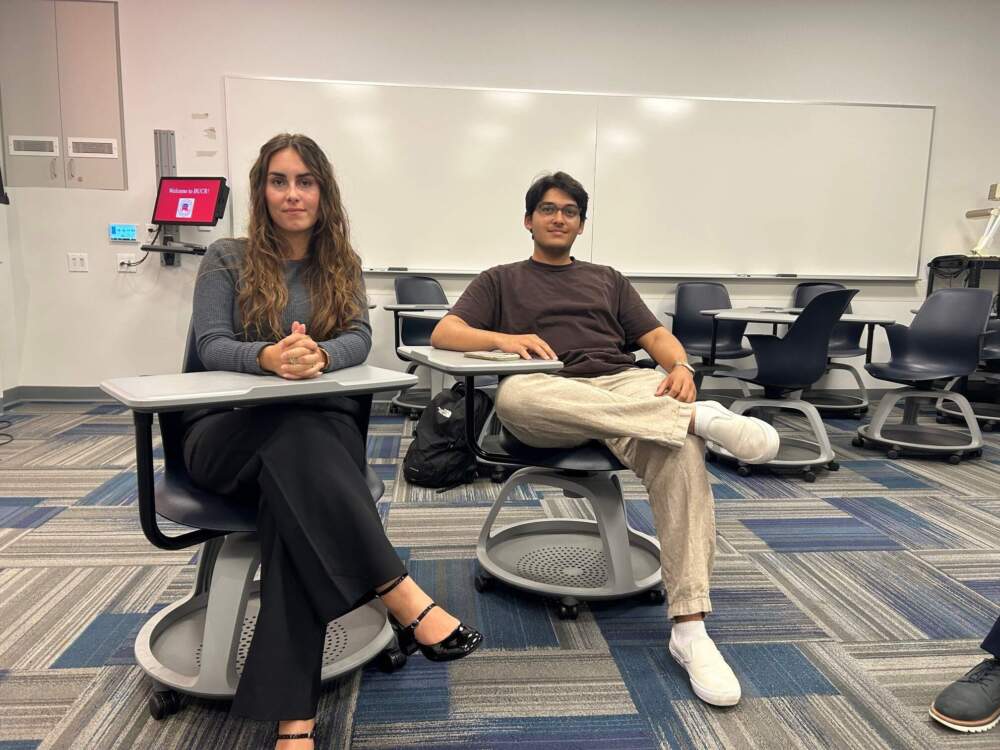More than a week after the assassination of Charlie Kirk, many Republican college students in Boston say they’re still in shock — and scared about the future.
Kirk, the conservative political activist who was gunned down last week at Utah Valley University, was deeply controversial. He was critical of gay and transgender rights; he called the Civil Rights Act “a mistake;” dismissed concerns about climate change and was accused more than once of antisemitism.
But he also provided comfort to conservative college students who say they often feel dismissed and unheard — even threatened.
This week, Jake Wiepert, president of the Republican student group at Boston College, sat in the shade on the Chestnut Hill campus. He said Kirk helped give young Republicans like him a voice; their group at BC has just 50 members, among an undergraduate student body of 10,000.
Kirk “definitely inspired us to be more open with our beliefs,” Wiepert said. It can be difficult to put yourself “out there,” he explained, when that means pushing against the majority opinion on campus. “But that’s what he was all about.”

Kirk rocketed to fame as a political activist and close ally of President Trump, who credits him with helping him win re-election. He founded Turning Point USA to promote conservative views on college campuses, where he often debated liberal students in a format he called “prove me wrong,” in which he invited students to challenge his views and then he’d forcefully push back.
“He was much better prepared than the students he debated,” said Kyle Spencer, a journalist and author of “Raising Them Right — The Untold Story of America’s Ultra-Conservative Youth Movement — and its Plot for Power.” Spencer, who followed the rise of Kirk, said that while the activist was willing to debate all comers, he skillfully used students as pawns to create online viral moments.
“He videotaped them and slapped them up on social media to depict liberal students as not very bright, confused, enraged,” she said.
On Monday evening, a couple of miles down the road from BC, another group of college Republicans gathered at Boston University to talk about Kirk’s murder. BU senior Julia Schultze opened the meeting by telling the 30 attendees they were in a “safe space,” where they could speak “and not feel like you are going to be killed on campus tomorrow.”
Zac Segal, a sophomore and president of the Boston University Campus Republicans, said Kirk left an important legacy.
“One of the biggest things that he managed to do was get Gen Z caring about politics and the conservative movement,” Segal said. Kirk made a strong case for young conservatives to speak up for their beliefs, he said, and showed them getting involved in politics is “almost cool.”
Rachel Rose, a BU sophomore from Long Island, is among those who said she’s felt afraid to share her politics on campus.

Until now, she hasn’t been politically active and didn’t know much about Kirk, she said. But after his murder, she felt compelled to speak up.
“I can’t decide if it made me more scared or made me want to do something,” Rose said. She acknowledged teetering between the two impulses, and said she’s still scared of being harassed for her political views.
“I am worried about people saying things on social media, and to my face,” she said.
Ivy Dowdle, a sophomore from Charlton, said Republicans on campuses like theirs, where liberal politics dominate, can feel shut down, even ostracized. A competitive swimmer, Dowdle said she began following Kirk when she heard him talk about athletes who were born male, competing against women like her.
“If you speak up for women in women’s sports you get called a bigot or transphobic,” she said. “That’s kind of how I got involved with Charlie.”
Many conservative students, including Segal, say they’ve been unnerved by some of the online reaction to Kirk’s murder. While many on the left condemned the assassination, Segal is troubled that some celebrated it. He sent a letter to university President Melissa Gilliam with three demands: hold accountable those who incite or glorify violence; make sure classrooms are spaces for debate, not “indoctrination”; and ensure the safety of college Republicans, many of whom are scared, according to Segal. (A BU spokesperson told WBUR that Gilliam has agreed to meet with campus Republicans to discuss their concerns.)
While his fellow student Republicans don’t necessarily share all of Kirk’s views, he said, many share at least some of them. “And if someone’s willing to kill Charlie Kirk for that,” Segal said, “then what’s to say that someone doesn’t want to harm us?”
Trump, who has survived two assassination attempts, has laid the blame for the nation’s growing political violence on what he calls the “radical left.” He doesn’t mention violence from the right, like the murders of a Minnesota lawmaker and her husband; the arson attack on the home of Pennsylvania Gov. Josh Shapiro or a plot to kidnap the Democratic governor of Michigan.
The college Republicans at BU and BC say they condemn all political violence. Soumil Mukherjee, a sophomore at BU, is worried that Kirk’s murder is just the latest evidence that America has entered a dangerous moment.
“ I don’t know whether we’re moving towards peace because I see both sides becoming more radicalized and a center not existing,” Mukherjee said. “The seams of society itself is splitting apart.”

Thursday night a candlelight vigil on Boston Common is planned to pay tribute to Kirk. Given his complex legacy — from self-described free speech advocate to divisive political force — it’s unclear if the event will help bridge the political divide, or split it further apart.

